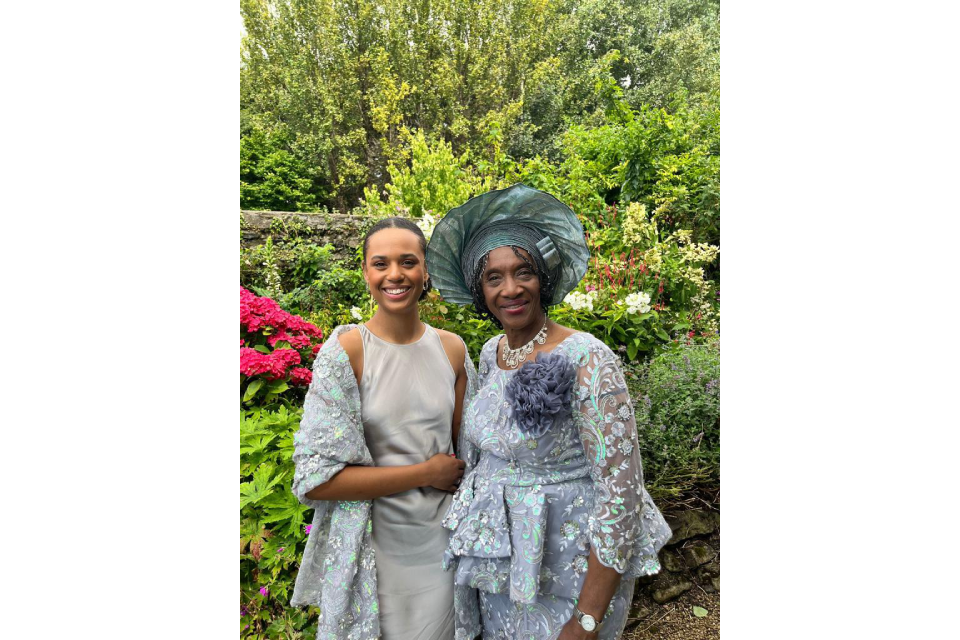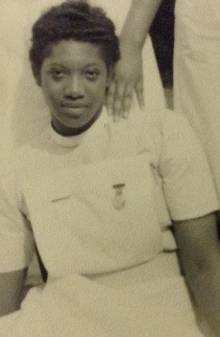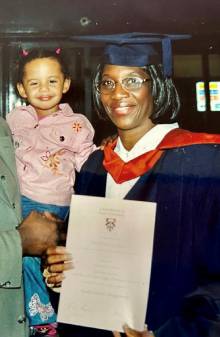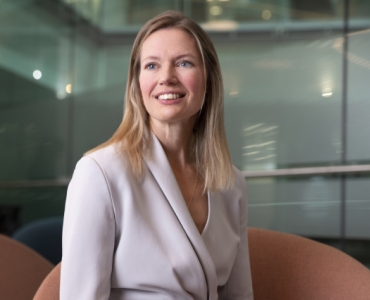
October 2023: To mark UK Black History Month and commemorate the essential contributions of the Black community to our society, our EMEA Black Affinity Network has embarked on a project to interview family members who are members of the Windrush generation.
This initiative enables us to delve into the stories that have helped shape the identities of our colleagues, celebrating their heritage and the narratives that define them.
Natasha Okoye is a trainee in London. She asked her grandmother, Dorritt Okoye, to look back on her experiences as part of the Windrush generation of Black Caribbean immigrants to the UK in the 1950s and 1960s.
Natasha Okoye: Tell us what led you to leave Jamaica for the UK?
|
|
Dorritt Okoye: As a child, I had the frightening experience of falling over and being rushed to hospital with a lacerated knee. The care and kindness of the nurse that looked after me left a long-lasting impression and a desire to become a nurse. After high school, I applied to come to the UK to train as a nurse, enabled by the 1948 British Nationality Act [which gave UK citizen status to Commonwealth residents]. |
Another important reason for coming to the UK was to support my parents financially. My parents came from humble beginnings and made great personal sacrifices to help me complete my education. They did everything they could to make me happy and comfortable during my childhood. It was now their reward time.
NO: What do you remember of the first few years in the UK? You always stress the importance of being kind to those around you, especially those coming from overseas—you never know when you might be the one experiencing a new culture or environment and when you might also need the help or support of others.
DO: I remember difficulties in adjusting to the weather. Arriving from Jamaica where I needed a fan to cool me down, I was now in the UK using indoor heaters! This was a new experience for me, as were the several layers of clothing, boots and gloves I needed to keep warm.
Other memorable experiences came from the newly multicultural population including differences in food, dress, places, time and length of worship, languages and intonation.
Finding Jamaican food was a challenge as it wasn't readily available in the shops. In the cold weather when I longed for the taste of home to warm me up, I would make a special effort to go along to the marketplace where imported Caribbean food was available. I remember on occasion taking care walking home on the icy pavement with my precious treasures of green bananas, plantains, yellow and white yams, dasheen and sweet potatoes.
NO: There is a sense from you that with commitment, hard work, the support of family and a strong sense of faith, anything is achievable, but I know it was not straightforward—what challenges did you face when settling in the UK?
DO: I can remember having mixed feelings of being in a country I had heard so much about as the 'mother country' and the uncertainty around not knowing what to expect. I then took a positive stance and embraced the opportunity of being in England.
One challenge was the response from children. I would often get looks from children who were possibly seeing a Black person for the first time. I was eventually able to get used to this as the parent or person with the youngster would usually either give me a smile or a frown as they hurried their child away. Thinking back, I remember the feeling of hurt I sometimes felt about this.

NO: How did you maintain connections with Jamaica?
DO: I maintained contact with my relatives in Jamaica, through exchange of air letters as telephones were an expensive luxury.
My kind-hearted aunt who was living in the UK was known by most new arrivals in the area. Most Saturday nights she would arrange social gatherings of newcomers and other older residing migrants. There would be varied cultural food and well-known music from a record player. The tunes were familiar, and the social interaction was useful, as news and events from home were shared whilst drinks, dance steps and food alternated.
We would dance until the early hours of the morning when we would have a brief rest before freshening up and getting ready to go to church on Sunday morning, as this was an important part of our culture.
NO: The determination of you moving to the UK from Jamaica as a teenager and your husband, my granddad, from Nigeria, has instilled a sense of ambition and resilience in your children and grandchildren. What do you hope future generations will learn from the experience of the Windrush generation?
|
|
DO: I hope future generations will learn from the ambition, determination and resilience of their elders and the Windrush generation who seized the opportunity to travel to a foreign country to better themselves and make a positive change in their economic circumstances for the benefit of themselves and their families. I hope they will learn about the need to adapt to new environments and the necessity of mixing peacefully with other cultures. |
I hope the future generations learn from the value the Windrush generation placed on education, skills and training for higher achievement in professional roles. I, for example, started my training as a State Enrolled Nurse but pursued varied nurse specialist and academic qualifications throughout my nursing career. I held a number of specialist and management roles and was awarded a 'Lifelong Learning Award' for successfully completing a degree in the latter years of my career.
After 50 years of nursing service, I retired with a satisfying feeling of accomplishment.
I hope that future generations will learn of the importance of continuous learning and seek to emulate this.
The other lesson that can be learnt is the value of writing and sharing one's story. It is why I have compiled my experiences as part of the Windrush generation in a book entitled "Yours Truly: Letters of Legacy". Everyone has a personal story and perspective which will be lost if not passed on—your story forms part of history.
White & Case's ongoing commitment to pro bono work in support of the Windrush Generation includes a multi-law firm project in collaboration with the Greater Manchester Immigration Aid Unit through which participating firms advise those affected by the Windrush scandal on navigating the compensation application process.







